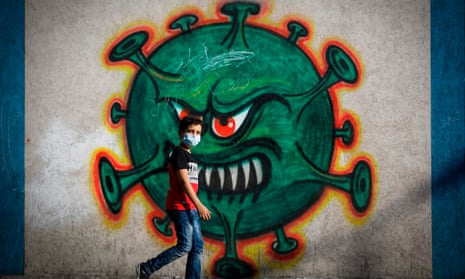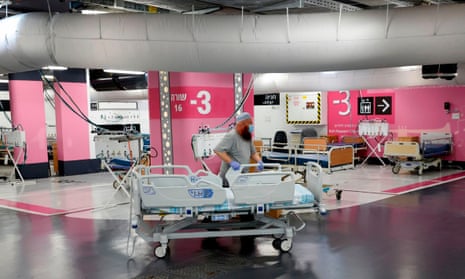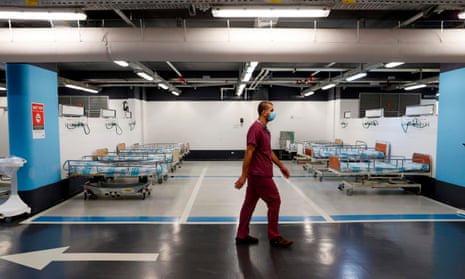We’ve launched a new blog at the link below – head there for the latest:
Dutch daily infections hit new high – as it happened
This blog is now closed. Follow our new blog below:
Wed 23 Sep 2020 18.42 EDT
First published on Tue 22 Sep 2020 19.11 EDT- Summary
- Major Covid outbreak at Glasgow University sees 600 self-isolate
- France tightens virus measures and unveils new "danger zones" map
- France again reports more than 13,000 new daily Covid-19 cases
- Summary
- Belgium easing restrictions despite sharp rise in cases
- Dutch daily coronavirus cases hit new high
- Indonesia reports biggest daily rise in coronavirus cases
- Ultraviolet lamp that can kill virus but is safe for humans launched in Japan
- Summary
- Japan considers allowing more foreigners in
- Mexico's confirmed coronavirus deaths approach 75,000
- US President Donald Trump calls 200,000 deaths 'a shame'
- Summary

Live feed
- Summary
- Major Covid outbreak at Glasgow University sees 600 self-isolate
- France tightens virus measures and unveils new "danger zones" map
- France again reports more than 13,000 new daily Covid-19 cases
- Summary
- Belgium easing restrictions despite sharp rise in cases
- Dutch daily coronavirus cases hit new high
- Indonesia reports biggest daily rise in coronavirus cases
- Ultraviolet lamp that can kill virus but is safe for humans launched in Japan
- Summary
- Japan considers allowing more foreigners in
- Mexico's confirmed coronavirus deaths approach 75,000
- US President Donald Trump calls 200,000 deaths 'a shame'
- Summary
Summary
Here’s a quick run down of the latest global coronavirus developments over the last few hours.
- France tightens virus measures and unveils new “danger zones” map. France’s health minister has unveiled a map of coronavirus “danger zones” around the country, with bars and restaurants closed from Saturday in Marseille.
- The UK recorded 6,178 new coronavirus cases, close to the highest daily figure ever recorded (6,201 on 1 May). However, there are more than twice as many tests taking place every day now as there were then. So, even though the case numbers are now similar, that does not mean the spread of the virus is the same because in the spring more positive cases were being missed.
- Major Covid outbreak at Glasgow University sees 600 self-isolate. A “significant” coronavirus outbreak at Glasgow University in Scotland has resulted in 124 cases since the beginning of freshers’ week and 600 students self-isolating across the campus amid warnings that any students found to be breaking the rules will face disciplinary action.
- France again reports more than 13,000 new daily Covid-19 cases. French health authorities reported 13,072 new confirmed Covid-19 cases over 24 hours on Wednesday, the daily tally standing above the 13,000 threshold for the third time in six days.
- Belgium is to ease coronavirus restrictions despite a sharp increase in cases. The prime minister, Sophie Wilmes, said that, from 1 October, people who have had contact with an infected person would only have to quarantine for seven days, and face masks would no longer be mandatory everywhere outside. The country of 11 million people recorded on average 1,374 new cases per day over the past week. In early July, there were about 80 a day.
- Climate crisis must not be overshadowed by Covid, Johnson to tell UN. The world cannot allow the climate emergency to be overshadowed by the coronavirus pandemic, the UK prime minister Boris Johnson will warn, but must “build back better” after the crisis by cutting greenhouse gas emissions as a matter of urgency.
Justin Trudeau’s government has announced ambitious plans to spend billions on childcare, housing and healthcare – partly financed by taxing “extreme wealth inequality” – as Canada braces for an economically devastating second wave of coronavirus.
But opposition parties quickly dismissed the minority government’s proposals, prompting speculation that Canada will soon head into another general election.
The prime minister’s speech from the throne – which customarily starts a new session of parliament and outlines a government’s priorities – was delivered by governor-general Julie Payette on Wednesday afternoon.
The speech included calls for green investment and a plan to create more than a million new jobs, but was overshadowed by the pandemic which has killed 9,241 Canadians and left 2 million unemployed.
“Like a reed in high winds, we may sway, but we will not break,” said Payette. She called Covid-19 “the most serious public health crisis Canada has ever faced”.

When UK prime minister Boris Johnson sought to explain during his address to the nation on Tuesday why some people had failed to follow the coronavirus rules, he had a surprising explanation: they’re just too British.
“We have kept that virus at bay. But we have to acknowledge this is a great and freedom-loving country, and while the vast majority have complied with the rules there have been too many breaches – too many opportunities for our invisible enemy to slip through undetected.”
The message prompted some obvious questions: just how fervent is Britain about freedom, and how has that affected the country’s response to the coronavirus?
Major Covid outbreak at Glasgow University sees 600 self-isolate

A “significant” coronavirus outbreak at Glasgow University in Scotland has resulted in 124 cases since the beginning of freshers’ week and 600 students self-isolating across the campus amid warnings that any students found to be breaking the rules will face disciplinary action.
A spokesperson for the university said the actual number of infections was likely to be higher, identifying two clusters at the Murano Street and Cairncross residences, which were linked to social activity at the start of freshers’ week, from 12-14 September.
The university said:
We are working closely with NHS Greater Glasgow and Clyde’s public health team to manage these. The student households affected are self-isolating and have access to food and other supplies.
Advice on medical issues including mental health and wellbeing is being made available. We have also increased the number of support staff liaising with our residences.
The university added that environmental health teams had inspected the residences on Wednesday and reported that robust procedures were in place.
British prime minister Boris Johnson will call on other leaders on Thursday to “build back better” after the coronavirus crisis and commit to net zero emission targets.
Addressing the United Nations’ climate action round-table, Johnson will say via videolink that the summit also offers world leaders an opportunity to announce new and enhanced Nationally Determined Contributions (NDCs) - their intended reductions in greenhouse gas emissions.
According to his Downing Street office, Johnson is expected to say:
As the world continues to deal with coronavirus, we must look ahead to how we will rebuild and how we can seize the opportunity to build back better.
We cannot let climate action become another victim of coronavirus. Let us be the leaders who secure the very health of the planet for our children, grandchildren and generations to come.
Scientists say the world is on track for catastrophic warming in the coming decades unless governments take rapid action to wean the global economy off fossil fuels and protect and restore forests, wetlands, peatlands and other ecosystems.
Britain has committed to reaching carbon neutral emissions by 2050, but some critics say the government has not taken the measures needed to reach its goal, calling on ministers to embed net zero into their coronavirus recovery plans.
The government, earlier this year, had to postpone a climate summit, COP26, due to take place in November, because of the coronavirus crisis. It is due to place next year in Glasgow.
Business secretary Alok Sharma, president of COP26, said:
The eyes of the world will be on COP26 when the UK hosts it in November next year. But tackling climate change cannot wait.
That’s why we are setting the stage now with a call to all those who are ready to step forward this December and set out bold new Nationally Determined Contributions for a clean and prosperous future.
New York’s famed Metropolitan Opera has cancelled its entire upcoming season and said it would remain closed until September 2021 due to the coronavirus pandemic, a sign of the continuing struggles for live entertainment.
The 3,800-seat opera house normally stages more than 200 performances each season and welcomes nearly 800,000 visitors.
The organisation said in a statement:
We regret to inform you that the Metropolitan Opera has made the extremely difficult decision to cancel the entirety of the 2020-21 season, based on the advice of health officials who advise the Met and Lincoln Center.
Because of the many hundreds of performers who are required to rehearse and perform in close quarters and because of the company’s large audience, it was determined that it would not be safe for the Met to resume until a vaccine is widely in use, herd immunity is established, and the wearing of masks and social distancing is no longer a medical requirement.
The Met said it had ambitious plans for a new season beginning in September 2021 with the premiere of Terence Blanchard’s Fire Shut up in my Bones, the first opera by a Black composer to be performed at the Met.
Operators of Broadway theatres, among the biggest tourist attractions in New York, currently aim to reopen in January 2021.
An Israeli hospital has transformed its car park into a ward as doctors confront a surge in coronavirus cases.
Michael Halberthal, general director of the Rambam Health Care Campus, expressed his frustration that his hospital in the northern city of Haifa has been pushed to take such a dramatic step.
“(It’s) extremely unfortunate that we have to get to this position,” he said.
Just days after management approved the decision, the underground car park has become a ward, complete with beds and wheelchairs - parking spaces have been converted into patient bays.

The new ward will be ready to open on Thursday, according to hospital officials, and can accommodate 770 coronavirus patients.
A string of hospitals that have seen their coronavirus wards hit capacity since the government imposed the country’s latest nationwide lockdown on Friday.

Israel has the world’s highest coronavirus infection rate as a proportion of its population, according to an AFP tally of the past fortnight, and on Wednesday the health ministry announced nearly 7,000 positive cases over 24 hours.
The country has recorded more than 200,000 cases since the pandemic hit, with 1,317 deaths.
Israel’s second wave of cases has hit particularly hard in the country’s north, home to much of the Arab minority that makes up around 20% of the population.
Four more Guatemalan officials have tested positive for Covid-19, after Guatemalan president Alejandro Giammattei and a culture minister were revealed last week to have contracted the virus.
The 64-year-old president said in a televised message on Wednesday that he had endured a “pretty terrible” night and woke up with body pains.
Giammattei added that the general subsecretary of the presidency and the viceminister of international relations had both tested positive.
Authorities told Reuters later that two other government advisors had also tested positive, bringing the total number of Covid-19 cases in the upper ranks of government to at least six.
Giammattei, the fourth Latin American leader to contract the coronavirus, announced he was infected just as the country was easing draconian travel restrictions imposed months ago to contain infections.
Guatemala in total has registered 87,442 cases and 3,154 deaths.
Britain said it was working with partners on the potential for “human challenge” clinical trials for a Covid-19 vaccine, where volunteers are deliberately infected with the virus to test the effectiveness of vaccine candidates, confirming an FT report.
A government spokeswoman said:
We are working with partners to understand how we might collaborate on the potential development of a Covid-19 vaccine through human challenge studies.
These discussions are part of our work to research ways of treating, limiting and hopefully preventing the virus so we can end the pandemic sooner.
Germany has added the French regions of Centre-Val de Loire, Brittany and Normandy, as well as the metropolitan region centred on the Portuguese capital Lisbon, to the list of destinations to which it warned against travel.
It has warned against travel to most of neighbouring Czech Republic following a rise in the number of Covid-19 cases in the country, the Foreign Ministry said.
“Currently, a warning is in force against non-essential, touristic trips to Czechia with the exceptions of the Ustecky and Moravia-Silesia regions,” the ministry said in a statement.
Germany warns against travel to regions within the EU where the rate of Covid-19 infections exceeds the level of 50 per 100,000 population in a week.
Large parts of France, including the capital Paris, are already subject to travel warnings.
France tightens virus measures and unveils new "danger zones" map
France’s health minister has unveiled a map of coronavirus “danger zones” around the country, with bars and restaurants closed from Saturday in Marseille.
Olivier Véran told a news conference the country would be divided into zones by alert level with Marseille, the second-largest city, and the French Caribbean island of Guadeloupe for now the only two areas put on the “maximum” alert level.
Paris and its suburbs along with Lille, Toulouse and six other cities were declared “reinforced danger zones”, Véran added.
“Should the sanitary situation worsen further in those areas, then a state of health emergency would be put in place”, the minister said.
Like other European countries where the infection rate has soared in the past month, France has been gradually tightening limits on public and private gatherings locally, hoping it will be enough to contain the disease and avoid a second national lockdown.
After a summer lull, president Emmanuel Macron’s government has been keen to let local authorities adopt measures locally depending on the severity of Covid-19 outbreaks, rather than taking broad measures from the central government in Paris.
In Paris and the other cities now labelled “reinforced danger zones”, attendance at major events will be limited to 1,000 people from the 5,000 allowed now, pre-planned events such as student parties will be banned, and bars and restaurants will have to close at 10pm at the latest.
Two government sources said Paris mayor Anne Hidalgo had strongly resisted restrictions on the opening hours of bars and cafes in the capital, arguing that this would be economically devastating for the sector.
Among other measures, there will be a ban on public gatherings of more than 10 people and, in “maximum” alert level areas like Marseille, bars and restaurants will be closed from Saturday.
Weather disasters and the Covid-19 pandemic have simultaneously hit tens of millions of people worldwide this year, making them more vulnerable to both threats and hampering emergency response, the Red Cross has said.
In a new analysis, the international humanitarian agency said about 70% of the 132 disasters linked to extreme weather in 2020 had coincided in place and time with the Covid-19 pandemic.
Globally, more than 51 million people - likely an underestimate - had been recorded as directly affected by an overlap of floods, droughts or storms and the pandemic, with nearly 3,500 people killed in the weather events, it said.
Francesco Rocca, president of the International Federation of Red Cross and Red Crescent Societies (IFRC), said:
The climate crisis has not stopped for Covid-19, and millions of people have suffered from the two crises colliding.
We have had absolutely no choice but to address both crises simultaneously.
While not all weather disasters have a direct link with global warming, the climate is becoming more volatile and weather more extreme as the planet heats up, he added.
The report, produced with the Red Cross Red Crescent Climate Centre, said the pandemic was complicating efforts to evacuate people, including a need for more shelters to respect distancing and prevent infection.
Disrupted global supply chains have also slowed the flow of relief aid and recovery equipment, the report said, and the pandemic has increased the need for financial humanitarian assistance at a time of deep global downturn.
The places where the colliding threats have shown up most clearly are India and Bangladesh, where almost 40 million people were affected by the pandemic and monsoon floods or storms.
The analysis also looked at the intersection between heatwaves and Covid-19. Nearly 432 million vulnerable people, including the elderly and infants, have struggled with the twin threat this year, including many in Europe and North America, it noted.
On the West Coast of the United States, meanwhile, more than 2 million people have had to deal with major wildfires and the pandemic together, with smoke potentially hiking the likelihood of lung infections including Covid-19, the report said.

Rocca said the Red Cross welcomed a rise in the number of volunteers helping out in their communities, particularly in developed Western countries, as well as a rise in donations for the Covid-19 response.
But Richard Blewitt, the IFRC’s permanent observer to the United Nations, warned of a “major gap” in funding for other humanitarian crises, such as the current flooding in Sudan.
Wealthy countries may also not deliver the $100bn they had promised this year to help poorer countries tackle climate change, he added. Rocca said:
The massive global investment in recovering from the pandemic proves governments can act decisively and drastically in the face of imminent global threats. We urgently need this same energy on climate.
The governor of Brazil’s São Paulo state, João Doria, said the state is likely to start to immunise its population with China’s Sinovac vaccine for Covid-19 in mid-December, pending regulatory approval.
Brazil has the third-highest number of cases of coronavirus in the world, leading vaccine makers to seek out the country to test their candidates.
São Paulo is one of the sites of Phase III clinical trials for the Sinovac vaccine conducted by the state’s Butantan Institute, a leading biomedical research centre.
Doria told a news conference 5m doses of the vaccine are expected to arrive in São Paulo, the country’s most populous state, in October.
The state has a deal with Sinovac for 60m doses to be delivered by the end of February, which Doria said is enough to vaccinate the state’s entire population.
Sinovac’s Latin America head, Xing Han, said the results of the Phase III trials should be out in two months.
Brazilian state governments have been aggressive in courting vaccine makers, with Bahia and Parana states striking deals to test and buy or produce the Russian Sputnik 5 vaccine.
Pfizer and partner BioNTech received Brazilian regulatory approval last week to expand trials of their vaccine in São Paulo and Bahia states.
The vaccine developed by AstraZeneca and University of Oxford has a production and distribution deal with the federal biomedical research institute Fiocruz and it is also being tested in Brazil by the federal university of Sao Paulo.